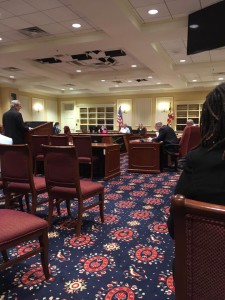By: Kaylene Wright
A bill that would permit eligible patients to receive investigational medical treatment has passed several readings in the Maryland House of Delegates and Maryland Senate.
The Right to Try Act would attempt to save lives by allowing eligible patients in need to try new investigational drugs, medical products, or treatments. These drugs must have completed Phase I, the safety phase, of a clinical trial, but have not yet been approved for general use by the U.S. Food and Drug Administration.
There is a companion bill in the House of Delegates that is sponsored by Delegate Karen Lewis Young. The bill currently faces no opposition. Both bills have been deemed favorable with amendments and have switched over to the other chambers.
There are also specific requirements for those who would use these products. An “eligible patient” is an individual that has: a terminal illness; considered all other treatment options currently approved by the FDA; received a recommendation by the treating physician; given informed consent; have been found ineligible to participate in a clinical trial; and documentation from the individual’s physician that they meet eligibility requirements.
Sen. Bryan Simonaire of Anne Arundel County, the bill’s main sponsor, says that the reasoning behind the bill was due to a specific incident. Abigail Burroughs, a 21-year-old woman fighting cancer, was denied a drug that was not currently approved by the FDA and soon died. The drug was FDA approved two years later.
“When I think of Abigail, I think of my seven children and how everyone should be given the opportunity to try a drug that may save their life, especially when it has passed FDA’s Phase I Trial and still in active testing,” Simonaire said. “When you are terminally ill and do not make it into a clinical trial, you are basically out of options. Only 3 percent of people requesting to participate in a clinical trial are accepted. This legislation is for the other 97 percent.
The Office of the Attorney General can handle the bill’s requirements with existing budgeted resources, and revenues are not affected, according to the bill’s fiscal note. There would be a potential meaningful impact on producers of the investigatory drugs, biological products, or devices.
Similar legislation h as been introduced in the Senate and has been unsuccessful. Simonaire said: “Senate Bill 63 from the 2016 legislative session was withdrawn due to many questions from members of the House Health and Government Operations Committee. The former chairman of HGO asked for time during the summer to study and review this legislation, the current process, and how effective it has been in other states. Legislation dealing with many stakeholders often takes a few years to get everyone on board.”
as been introduced in the Senate and has been unsuccessful. Simonaire said: “Senate Bill 63 from the 2016 legislative session was withdrawn due to many questions from members of the House Health and Government Operations Committee. The former chairman of HGO asked for time during the summer to study and review this legislation, the current process, and how effective it has been in other states. Legislation dealing with many stakeholders often takes a few years to get everyone on board.”
The bill has been amended to address concerns from several stakeholders, including the Office of the Attorney General, Maryland Insurance Administration, MedChi, U.S. Oncology, Maryland Oncology Hematology, and more.
The federal Food, Drug, and Cosmetic Act prohibits sale or distribution of products that have not received FDA approval. Under the FDA’s Expanded Access Program, an investigational medical product may be used outside of a clinical trial. Between 2009 and 2015, the Expanded Access Program received between 1,000 to 1,900 applications annually and nearly all of them were approved.
In 2013, the Goldwater Institute designed a model bill to create a path for terminally ill patients and their physicians to bypass the FDCA through state law. Currently, 33 states have adopted a form of the Right to Try Act.